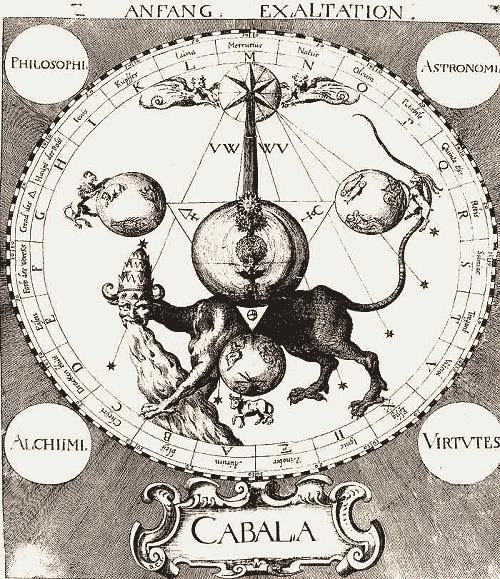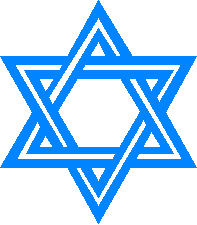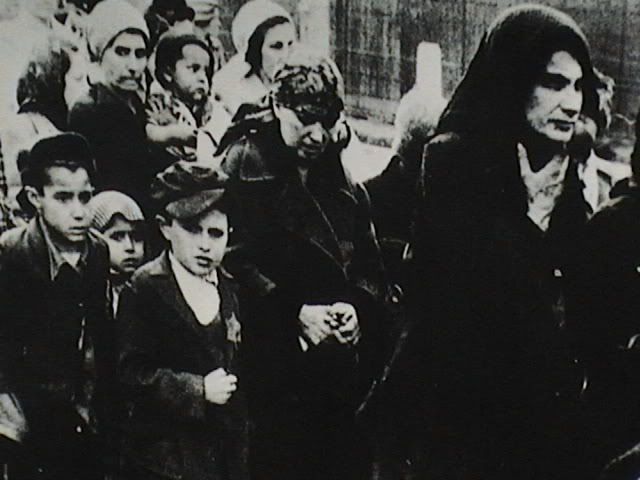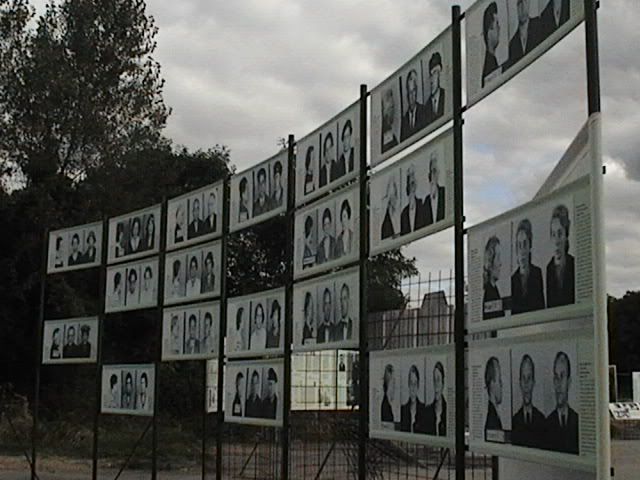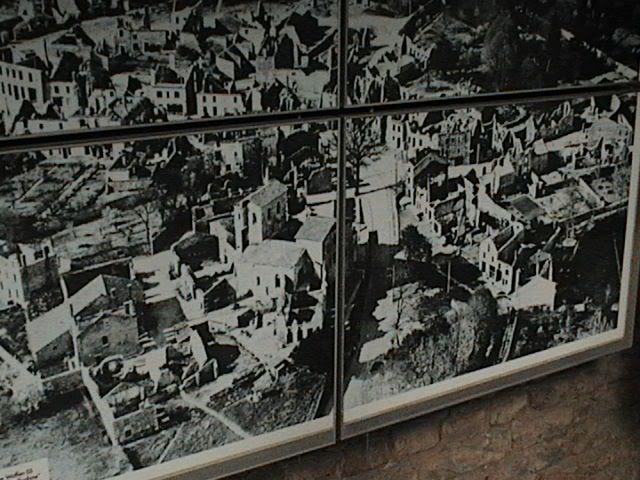Wednesday, December 20, 2006
REVIEW QUESTIONS
1. Elie Weisel's childhood home was in Sighet, Transylvania.
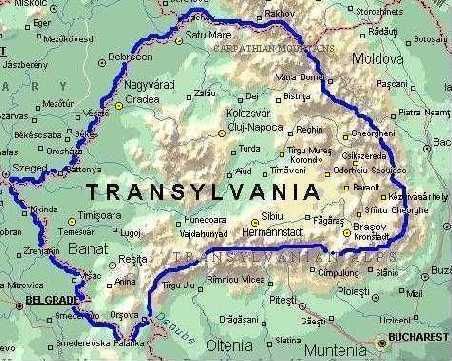
2. The cabala is or rather, referrs to a collection of mystical and ethical Jewish writings, mostly dating from the medieval period. It consists of a good part of speculative and symbolical interpretations of Hebrew scriptures.
3. The truths that Weisel was referring to were the truths about the human race, why we do what we do, and ever the more information and investigation into his faith and his God. The kind of truths that Weisel was ignorant of were those that dealt with the fact that not all humans treat others with kindness, and that you cannot control what others say, do, and/or think.
4. Moshe the Beadle was a significant figure in the novel because he taught Elie all that he wanted to know about the cabala and about thier religion and faith. What he tells Elie about answers, questions, and the truth is that you have to search for what you want to find it. Moshe was prescient in his admonition to Elie because he had seen the horrors that were to come to them, (the Jewish,) if they did not leave as he was informing them to do.
5. The people of Sighet ignore Moshe the Beadle after his escape because they are naive, and believe that what he is telling them is very far from the truth. They do not listen to him because they believe he is crazy, and they do not want to believe that what he is saying is true.
6. Madame Schatcher is the lady boarded on the "Jewish train" on thier way to Auschwitz. She is considered "crazy" by the people in the train because of what she says. People do not listen to her however, and this is how she is similar to Moshe the Beadle. Her "prophesies" are not believed by the passengers on the train.
7. This passage was all about the experiences which led Elie Wiesel to lose faith in his God, to lose faith in his people, to lose faith in himself. This is a paragraph in which he expresses his strong feelings towards his experiences during the holocaust.
8. Basically, this passage was about young Elie's emotional outcome, and his emotional scarring after the holocaust had ended. This is about how he will never forget the horrors that happened to him and his family. For as long as he shall live, he will always remember.
9. Throughout Night, Elie first believes that there IS a God, and that He is always constantly present, no matter who you are, what you've done, or where you've been. However, while in camp, his view of a god changes. He then believes that if there was in fact a "GOD" then this concentration camp would be non-existent. That 'How can God let this camp run on, if in fact, there is a God?'. Other people in the camp thought otherwise; that there IS a God, and that He is using this camp to test their faith.
10. The literal meaning that night has in Night is that it is simply dark outside, time for sleep and rest. However, the figurative, or symbolical, meaning that night has in Night is much more complex and intricate. What night stands for is the darkness that surrounds the Jewish and the oppressed. The emptiness that these people felt, the feeling of being alone in the world with no-one there beside them, to help and guide them from this madness, this ludacris idea and plan that Adolf Hitler was carrying out.
11. Night in my opinion is a very small novel because Elie Wiesel first, did not wish to relive all of the horrors that the holocaust put upon him, and secondly, that he did not wish to give all details of his time there, that some things were meant for others to read and learn about, and that other things were simply meant to be buried in the minds and thoughts and hearts of those who witnessed and lived through them.
12. Night can be interpreted as both a memoir of tragedy and of triumph. Tragedy because of the understated horrors that occurred during the holocaust and those specifically mentioned in the novel. Triumph because of the courage and the strength it took those survivers to keep going, to keep living, to keep alive, to survive.
Monday, December 18, 2006
REACTION JOURNAL
PAGES 1-10
December 18, 2006/Page 9: "We drank, we ate, we sang. The Bible bade us rejoice during the seven days of the feast, to be happy. But our hearts were not in it. Our hearts had been beating more rapidly for some days. We wished the feast were over, so that we should not have to play this comedy any longer."
- This quote struck me as very odd. As a member of a religion which practices great religious faith, it seemed very odd that they would wish the feast to be over. Normally, one would rejoice in this feast, and this vacation from the world of brutal reality. However, these people were wishing for their sacred feast to be over. Wishing their sacred feast to be over. This is very abnormal, and gives clues to what may become of their religion later on.
PAGES 11-20
December 18, 2006/Page 14: "There was joy-yes, joy. Perhaps they thought that God could have devised no torment in hell worse than that of sitting there among the bundles, in the middle of the road, beneath a blazing sun; that anything would be preferable to that. They began their journey without a backward glance at the abandoned streets, the dead, empty houses, the gardens, the tombstones....On everyone's back was a pack. In everyone's eyes was suffering drowned in tears. Slowly, heavily, the procession made its way to the gate of the ghetto."
- This quote literally jumped out at me. Included are extremely powerful emotions. It is extremely emotional and depressing knowing that these people believed they were headed to a better place. Instead, what they got was a place of torture and inprisonment. They were glad to be leaving their homes and lives. Just to "pick up where they left off" is what they thought. Oh, were they very mistaken.
PAGES 21-30
December 18, 2006/Page 25: "We looked at the flames in the darkness. There was an adominable odor floating in the air. Suddenly, our doors opened. Some odd-looking characters, dressed in striped shirts and black trousers leapt into the wagon. They held electric torches and truncheons. They began to strike out to right and left, shouting: 'Everybody get out! Everyone out of the wagon! Quickly!' We jumped out. I threw a last glance towards Madame Schachter. Her little boy was holding her hand. In front of us flames. In the air that smell of burning flesh. It must have been about midnight. We had arrived-at Birkenau, reception center for Auschwitz.
- This is probably the first quote in the book that describes their first realization that they were not headed to Hungary. They realize quickly that where they are headed, by the distict descriptions, that it is not any place worth rejoicing for. It must have seemed to them that they were headed for complete and total torture, and to put it bluntly, hell. They would later find out that there was much worse to come. Which is both extremely sad, and utterly diminishing of any hope at all for these poor souls.
PAGES 31-40
December 19, 2006/Page 31: "'Yitgadal veyitkadach shme raba... May His Name be blessed and magnified...' whispered my father. For the first time, I felt revolt rise up in me. Why should I bless His name? The Eternal, Lord of the Universe, the All-Powerful and Terrible, was silent. What had I to thank Him for?"
-This quote here signifies one of the first doubts that Elie has of his God. His father, still very religious, prays to Him. However, Elie, acting very immaturely, naively states "What had I to thank Him for?". This shows that the first job of the Germans was in the process of being accomplished. They wished to wipe out the Jewish race. The first step in doing that was to make them doubt their own God. This evil act is already in the process, as is expertly, yet subconciously demonstrated by Elie himself.
PAGES 41-50
Tuesday, December 05, 2006
balneo-, balne-
(Greek > Latin: bath, bathing; wash, washing)
balneal: Of or pertaining to baths or to bathing.
balnearii: People who steal clothing from public baths.
balnearil: The people who stole clothing from a public bath in ancient Rome.
balneary: A bathing room.
balneation: The act of bathing.
balneatory: Belonging to a bath.
balneatrix, balneatricis: Caretaker of a bath (feminine).
balneography: A written description about baths.
balneological: Of or pertaining to balneology.
balneologist:1. A specialist or expert in balneology.
2. Someone who practices in the profession of balneotherapy.
balneology: The scientific medical study of bathing and medicinal springs.
balneophile, balneophilist: A collector of pictures of bathing girls or a fondness for collecting pictures of girls in swimsuits.
baro-, bar-, bary-
(Greek: weight, heavy; atmospheric pressure; a combining form meaning "pressure", as in barotaxis, or sometimes "weight", as in baromacrometer )
baragnosis, baragnosia, baroagnosis: 1. The inability to appreciate or estimate weight.
2. Loss of the sense of weight.
baranesthesia: Insensibility to weight or pressure on the body.
baroceptor: In physiology, a pressure-sensitive receptor organ of the nervous system, found, for example, in the walls of blood vessels.
baroclinity, baroclinicity, barocliny: In physics, a state of fluid stratification in which isobaric surfaces and isosteric surfaces are not parallel, but intersect.
barocyclonometer: An aneroid barometer with diagrams and directions for detecting the existence of a storm at a distance of several hundred miles.
barodontalgia: Toothache associated with the reduction in atmospheric pressure in high-altitude flying. Also: aerodontalgia.
barodynamics: In mechanics, the study of the mechanics of heavy structures that are liable to collapse under their own weight.
baric: Relating to barometric pressure (as in isobar) or to weight generally.
bentho-
(Greek: deep, depth; the fauna and flora of the bottom of the sea; sea bottom; depth [by extension, this element includes lake, river, and stream bottoms])
benthos: 1. Those organisms attached to, living on, in or near the sea bed, river bed, or lake floor.
2. The biogeographic region at the bottom of a sea or ocean (or, more broadly, at the soil-water interface of an ocean, sea, or lake). The organisms living in such a region include the permanently attached or immobile forms (e.g., sponges, corals, oysters), creeping forms (e.g., crabs, snails), and the burrowing animals (e.g., worms). Barnacles, the larger seaweeds, and sea squirts are also members of this group.
3. The organisms living on sea or lake bottoms. The benthos are divided into sessile organisms (those that are attached to the bottom or to objects on or near the bottom) snd vagrant organisms (those that crawl or swim along the bottom).
Berserk
(Old Norse: berserkar, literally, “bear’s skin”; a Norse-myth warrior)
berserk: 1. Behaving in an uncontrolled way as a result of anger or irrational feeling; to go berserk.
2. Extremely excited or enthusiastic about something (informal): "The crowd went berserk when the movie star finally appeared."
3. Destructively or frenetically violent: "The berserk worker started to smash all of the windows."
4. Mentally or emotionally upset; deranged: "She was berserk with grief."
5. Informal: Unrestrained, as with enthusiasm or appetite; wild: "They went berserk over the chocolates."
bio-, bi-, -biotic
(Greek: life; living, live, alive, bi- meaning "two")
biophotometer: An obsolete instrument once used for measuring the rate and degree of dark adaptation, as in vitamin "A" deficiency.
biophylaxis, biophylactic: Nonspecific defense reactions of the body, e.g., phagocytosis, vascular and other reactions of inflammatory processes.
biceps: A muscle with two points of origin; especially, the large muscle at the front of the upper arm that flexes the elbow joint and the large muscle at the back of the thigh that flexes the knee joint.
biophysics: 1. The science dealing with the mechanical and electrical properties of the parts of a living organism.
2. The study of biological processes and materials by means of the theories and tools of physics.
3. The study of physical processes (e.g., electricity, luminescence) occurring in organisms.
4. The science that applies the laws and methods of physics to the study of biological processes (used with a singular verb).
biophysiologist: One who investigates the physiology of living beings.
biophysiolography: Structural or descriptive biology.
biophysiology: That part of biology that includes organogeny, morphology, and physiology.
biophyte: A plant that feeds on other living organisms; a parasitic or predatory plant; or plants that get sustenance from living organisms.
Biopiracybiopiracy
1. Biological theft; illegal collection of indigenous plants, microbes, enzymes, etc. by corporations who patent them for their own commercial use.
2. The commercial development of naturally occurring biological materials; such as, plant substances or genetic cell lines, by a technologically advanced country or organization without fair compensation to the peoples or nations in whose territory the materials were originally discovered.The patenting of plants, genes, and other biological products that are indigenous to a foreign country; for example, some developing tropical nations are saying that if the West cries foul over piracy of intellectual property or computer software, then biopiracy in Western labs of jungle extracts should also be considered a high economic crime.Biopiracy usually refers to the privatization and unauthorized use of biological resources by entities (including corporations, universities, and governments) outside of a country that has pre-existing knowledge. This privatization and use is sometimes claimed to be predatory. Particular activities usually covered by the term are: Exclusive commercial rights to plants, animals, organs, microorganisms, and genes; as well as, commercialization of traditional communities' knowledge on biological resources; and patenting of biological resources.
bromo-, brom-
(Greek: stench, stink, bad odor; unpleasant bodily odor; bromine)
bromhidrosis, bromidrosis: 1. Sweat that is fetid or offensive due to bacterial decomposition. It occurs mostly on the feet, in the groin, and under the arms.
2. Also called kakidrosis, cacidrosis, fetid sweat, fetid perspiration, osmidrosis, ozochrotia. Bromhidrosis, or body odor, is caused by bacteria growing on the body. These bacteria multiply considerably in the presence of sweat, but sweat itself is almost totally odorless. Body odor is associated with the hair, feet, crotch (upper medial thigh), anus, skin in general, breasts, armpits, genitals, and pubic hair.
bromidrosiphobia: A mental disorder in which there is an abnormal fear of personal odors, accompanied by hallucinations.
bromidrosiphobia, bromidrosophobia: An abnormal fear of one’s own personal body odors or those from others; sometimes with the belief that such an odor is present even when it is not.
bromohyperhidrosis: Profuse bromhidrosis. Also known as, bromohyperidrosis.
bromomenorrhea: Menstruation characterized by an offensive odor.
bromopnea: 1. A strong, offensive smell, or stench from the mouth.
2. Foul breath which may be caused by a disease within the mouth (dental caries, severe ulcerative stomatitis, ulceromembranous pharyngitis, etc.) or the nose (ozena, malignant disease, etc.), but frequently defies medical diagnosis.
3. Also known as, halitosis, fetor ex ore, stomatodysodia, and ozostomia.
caco-, cac-, kako-, kak-
(Greek: bad, harsh, wrong, evil; incorrect; unpleasant; poor; used most of the time as a prefix)
alexicacon, alexikakon: A preservative against evil; a safeguard against bad.
cacaerometer: Measuring bad air.
cacaesthesia, cacesthesia, kakesthesia: Abnormal dysfunctional sensations on the skin; such as, a feeling of numbness, tingling, prickling, or a burning or cutting pain; heightened sensitivity. Also, dysesthesia and paresthesia.
cacergasia, kakergasia: The malfunctioning of the functions and reactions of the total individual in contradistinction to the functions of individual organs or parts of the human organism.
cachectic: Relating to or suffering from cachexia.
cachexia, cachexy: 1. A state of ill health, malnutrition, and wasting. It may occur in many chronic diseases, certain malignancies, and advanced pulmonary tuberculosis.
2. A general weight loss and wasting occurring in the course of a chronic disease or emotional disturbance.
3. A chronic catabolic state, associated with certain infections and malignancies, characterized by weight loss that continues despite the consumption of an adequate diet.
cacidrosis, kakidrosis: Sweat that is fetid or offensive due to bacterial decomposition. It occurs mostly on the feet, in the groin, and under the arms.
cacochylous: A reference to bad chyle or difficult digestion.
cacodemon, cacodaemon, cacodemonia: 1. An evil spirit or demon.
2. A name for nightmare.
cacodemoniac: One possessed with an evil spirit.
cacodemonomania: A delusion that one is, or is about to be inhabited by or possessed of, a devil or some evil spirit (demon).
cacodermia: Bad skin; i.e., a condition in which one has a pimply or rough skin.
cacodontia, cacodentia, cacodental: Having bad or malformed teeth.
cacodorous: Bad-smelling, ill-smelling, malodorous.
cacodox: Holding what is considered to be wrong or evil opinions, teachings, or doctrines.
digit-, digiti-
(Latin: finger, toe; from Greek daktylos)
bidigitate, bidigital: Having two digits, fingers, or finger-like processes.
digit: 1. A finger or toe in human beings or the corresponding part in other vertebrates.
2. Any of the Arabic numerals 0 to 9; one of the elements that collectively form a system of numbers.
3. Any of the symbols of other number systems, as 0 or 1 in the binary.
4. The width of a finger used as a unit of length, equal to approximately 2 cm (3/4 in).
5. In astronomy, the twelfth part of the sun's or moon's diameter; used to express the magnitude of an eclipse.In anatomy, a jointed body part at the end of the limbs of many vertebrates. The limbs of primtes end in five digits, while the limbs of horses end in a single digit that terminates in a hoof. The fingers and toes are digits in humans.
digital: 1. Pertaining to, resembling, or using a digit or digits.
2. Resembling an impression made by a finger.
3. Pertaining to data in the form of discrete states as contrasted to analog data in the form of continuously variable physical quantities.In computer science, representing or operating on data or information in numerical form. A digital clock uses a series of changing digits to represent time at discrete intervals; for example, every second. Modern computers rely on digital processing techniques, in which both data and the instructions for manipulating data are represented as binary numbers.
digitalgia: Pain in a digit.
digitalgia paresthetica: Pain, paresthesiae, and numbness restricted to the distribution of a single digital nerve.
digitaliform: A reference to the form of the corolla of the fox-glove.
digitalis: The dried leaf of Digitalis purpurea, the purple foxglove.The flower digitalis, long known as a heart stimulant, is so named bcause a human finger, or digit, fits snugly into one of its deep-throated bells.
digitalisation, digitalization: The administration of digitalis for the treatment of certain heart disorders.
digitally: By means of digits; in digital form.
digitaria: Crab grass; finger grass.
digitary: Of or pertaining to the fingers.
digitate: 1. Having fingers or toes, or having parts that are like fingers or toes; having radiating divisions or leaflets resembling the fingers of a hand.
2. A description of leaves that have divisions or parts arrayed from a central point like the spread fingers of a hand.
digitate: 1. Possessing several fingerlike processes or impressions.
2. Arranged like the fingers of the hand.
3. Of quadrupeds that have separate or divided digits or toes.
4. Of leaves, etc.: Having deep radiating divisions; now usually applied to compound leaves consisting of a number of leaflets all springing from one point, as in the horse-chestnut.
digitated: Having divisions for the toes.
digitately: 1. Having digits or fingerlike projections.
2. In botany, having distinct parts arising from a common point or center; palmate.
